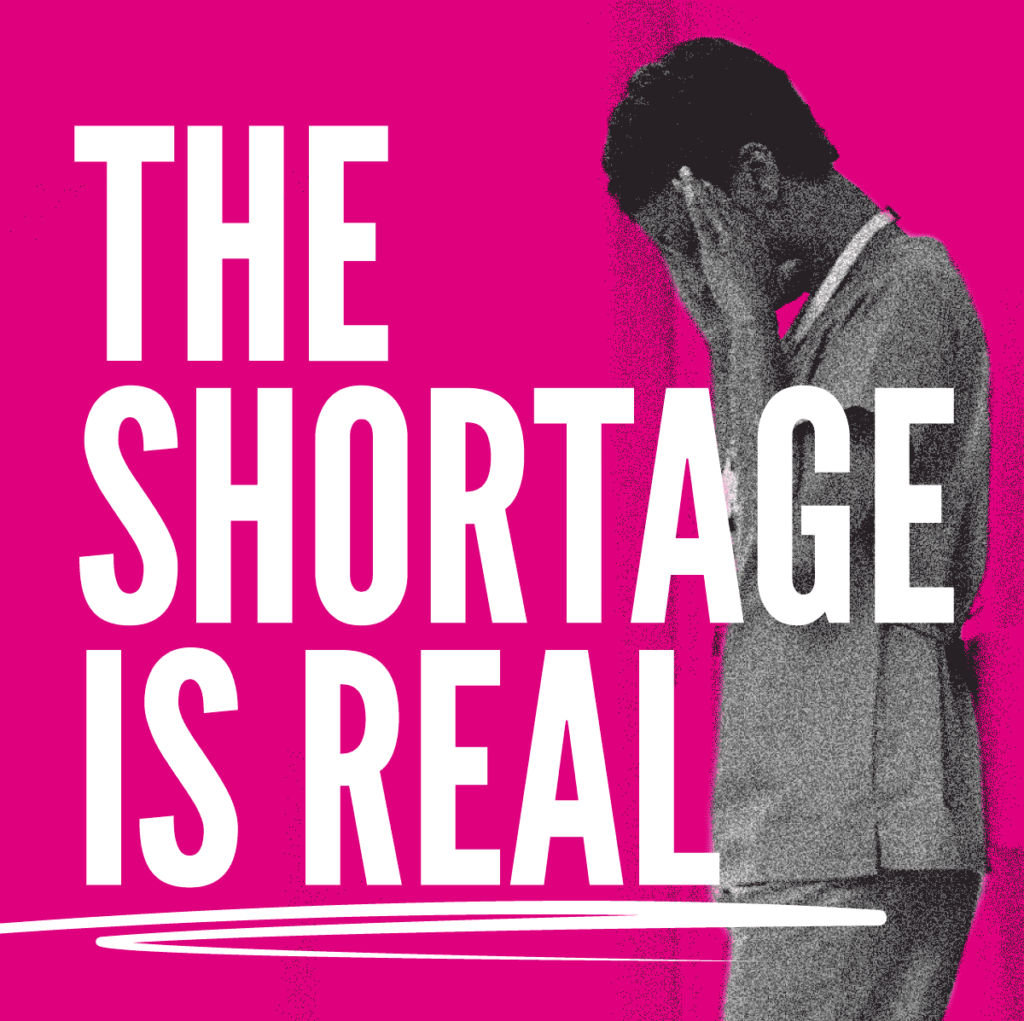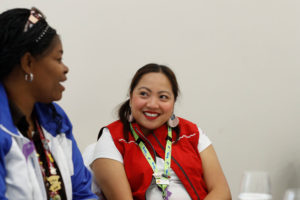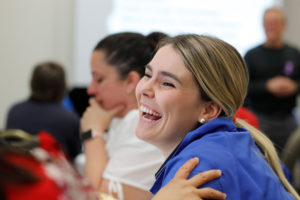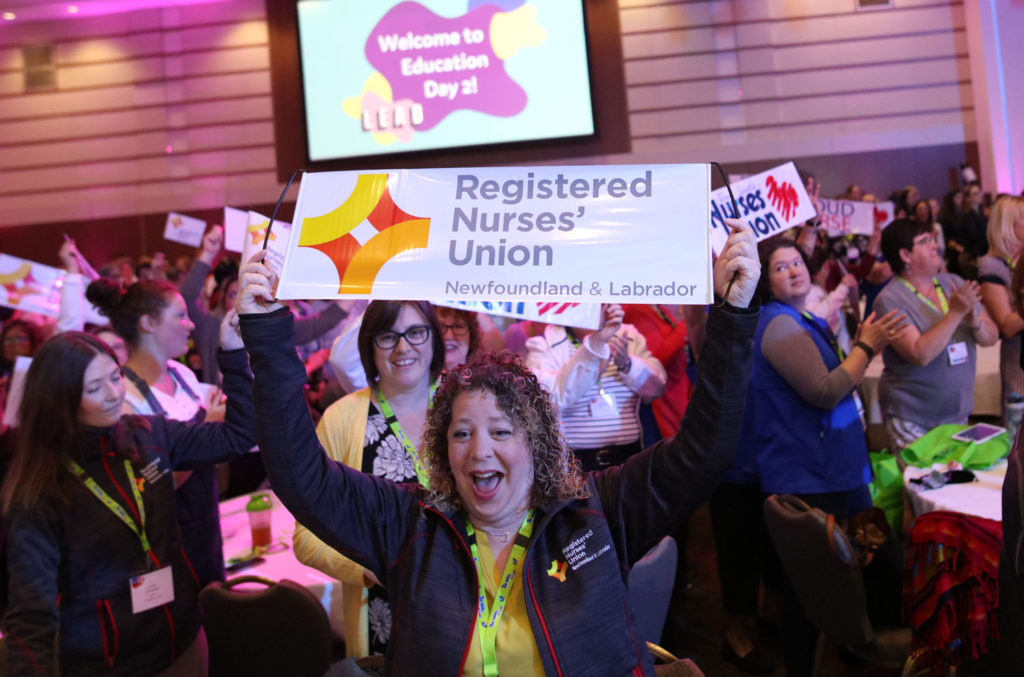
Safe staffing saves lives. Yet, according to experts in yesterday’s plenary session, safe staffing is the single biggest issue facing nurses across the world.
For delegates at Wednesday morning’s plenary session, what they heard only reinforced what they’ve known for some time: safe staffing levels improve patient outcomes, nurse satisfaction, retention and recruitment. The international panel was made up of Dr. Linda McGillis Hall from University of Toronto, Dr. Walter Sermeus of the University of Leuven in Belgium, Phil Ni Sheaghdha of the Irish Nurses and Midwives Organization, Deborah Burger, co-president of the National Nurses United (U.S.A.), and Judith Kiejda of the New South Wales Nurses and Midwives Association, and each shared what is happening in their home countries.
Kiejda opened by sharing her personal experience with nurse-patient ratios, stating: “I travel the world often and can tell you that safe staffing is the single biggest issue facing nurses everywhere without exception.”
Unfortunately, Canada has been slow to recognize the need for safe staffing levels. To make matters worse, Canadian-based research is lacking. Recognizing the gap, ONA is leading the way by working with McGills Hall to conduct the first RN4Cast-type study in Canada. According to her, Ontario nurses’ top concerns include burnout, nurse dissatisfaction and short-staffed hospitals. There’s also a strong concern for new grads entering the workforce.
Sermeus shared the current status of nurse-patient ratios in Europe and their evolution. The RN4Cast study showed a direct correlation between the number of patients per nurse and patient mortality.
“We see mortality going down when you have to take care of fewer patients. Staffing levels really save patients’ lives”.
According to Sermeus, there’s no magic ratio. But some countries are trying to get there, turning to legislation or soft recommendations to establish a baseline.
“Staffing levels have to go up. How you do it, I don’t care. They just have to go up.”
That sentiment was echoed by Deborah Burger, who is advocating for federal legislation to mandate nurse-patient ratios in the United States.
“There isn’t a shortage of nurses. There’s a shortage of nurses that are willing to work in the disaster areas that are hospitals without ratios.”
With all Canadian provinces facing (and feeling!) a growing nurse shortage, the CFNU has commissioned a national study led by McGillis Hall. Its aim will be to help governments and major health care organizations find solutions to an anticipated crisis. The national nurse staffing survey will study nurses (RNs, NPs, LPNs and RPNs) in all sectors, collecting data on current staffing levels, workload, working conditions, staff burnout and education. Keep an eye for information from your union for your chance to participate!
 |
 |
 |
Max FineDay comes from a long line of storytellers from Sweetgrass First Nation, a Cree reserve in Saskatchewan. For the Cree and many other First Nations, storytelling is a powerful teaching tool. Members who attended FineDay’s workshop yesterday got to experience the power of storytelling firsthand.
To start off, FineDay walked the group through the complicated story that led to need for reconciliation. He playfully compared this part of Canadian history to the breakdown of a relationship.
First Nations meet European colonialists. They start communicating, learning from each other and trading. They move in together too quickly, so they decide to set some ground rules. Canada breaks the vows it made to First Nations people in the Numbered Treaties. The relationship goes off the rails, and now Canada is sorry and is trying to reconcile.
Of course, this story is much more complicated than this rendition. The hurt caused to First Nations people throughout this part of our history is unimaginable. It’s been ten years since the creation of the Truth and Reconciliation Commission; according to FineDay, things have improved, but the reconciliation process is not a straight line.
After creating a safe space for members to dialogue and share poignant stories, a common theme emerged: nurses want to do more. They want to play a key role in the reconciliation process – but how can they contribute?
FineDay believes participating in a session like the one held yesterday is a great first step; we can all learn from sharing our experiences.
This proved true when Juanita Rickard, vice-president of the Canadian Indigenous Nurses Association, spoke up during the session to let participants know how her organization works to improve the health of indigenous people.
“Joining our association helps push the movement of reconciliation by providing members with information, resources and education to promote better health for indigenous people, while also cultivating respectful care environments,” said Rickard.
And, of course, storytelling is an amazing tool. FineDay suggests listening to stories and sharing them with our families, colleagues and friends. Push past the instinct to avoid conflict; instead, correct misinformation and call out prejudice. Asking questions, speaking truths and acknowledging our entire history – the good, the bad and the ugly – can promote understanding and change.
FineDay summed up the session sharing the role that unions can also play in reconciliation.
“I know the power you hold. There’s a great amount of work to be done by our labour force and unions to keep the pressure on our government and employers. Your unions can lead very powerful change in this country to contribute to reconciliation.”
Substance use disorder and addictions are illnesses that can affect anyone, including nurses. All of us should know the warning signs and report problematic behavior – that was the message heard by about 50 nurses who participated in the Nursing and Substance Use Disorder workshop.
Facilitators Susanne Priest, of the Nurses Association of New Brunswick, and Lilo Wessels, of the Nova Scotia Nurses’ Union, started the workshop by showing just how pervasive these illnesses are. Participants were asked to raise their hands if they know a friend or family member who struggles with a substance abuse problem: nearly everyone raised their hand.
Addictions can disrupt all aspects of an individual’s life. For many, the impacts of the addiction have wide-ranging consequences beyond their physical and mental health. It can lead to legal issues, such as impaired driving charges, conflicts at work or home, and eventually civil or criminal charges. Participants were told that those suffering from addiction exhibit common behavioral signs. For example, in addition to more obvious signs we commonly associate with impairment, individuals struggling with addiction often show subtler signs like declining work performance and absenteeism.
Nurses were urged to report problematic behavior to their employer, who is ultimately responsible for investigating such matters. If left unaddressed, it could cost a nurse their professional license and their job.
There were sobering facts and statistics cited throughout the presentation. For example, 98 per cent of people with substance use disorder have an underlying mental health issue, such as anxiety or depression. Of those with substance use disorder, 70 per cent have experienced some form of abuse in their past, whether physical, sexual or verbal in nature. On average, individuals struggling with addiction die 10 years earlier than the general population. These illnesses have been shown to have a genetic component, but no one is immune to addiction.
Priest and Wessels emphasized that stigmatization often prevents users from admitting they have an illness and seeking treatment. The guiding principle is to always treat those suffering from addictions with compassion, dignity and respect. Addictions are not weaknesses; it’s important to bear this in mind and understand why those struggling with addiction need help.
Despite the seriousness of the conversation, nurses were reminded that there is hope for anyone suffering from addiction. Treatment options have proven highly effective for various substances, including alcohol. Anyone who suspects they may suffer from addiction is strongly encouraged to seek help. For nurses, union representatives can help guide a member through the process of surrendering their nursing license while they access treatment and plan a gradual return to work thereafter.

Could health care in general and pharmacare in particular be the compelling election issue that effectively defuses hate and extremism in Canadian politics?
Workshop facilitator and CFNU government relations officer Sebastian Ronderos-Morgan asked the question this way: “What’s the answer to rising extremism and the hate agenda? Can we use health care as a way to heal this corrosion in our society?”
“If you can offer a solid public proposal, you can actually respond to the fears of economic instability that people have,” he proposed.
About 100 delegates at the CFNU biennial convention in Fredericton took part in the workshop designed to help them gear up for this 2019 federal election.
Thanks to the work of the CFNU members and other health care stakeholders, Ronderos-Morgan said, “this is the first time that pharmacare is going to be a top social issue in Canada. Nurses’ activism has made something that wasn’t even on the agenda into a major national issue.”
However, he warned, pharmacare advocates must up their game as the election nears to overcome the big-money players of the private health care and insurance sectors, who are determined to block a single-payer prescription drug plan that is universal, public, accessible, comprehensive in coverage and portable anywhere in the country.
Facilitator Kristy Johnston, a front-line nurse from Sudbury and member of the Ontario Nurses’ Association, warned workshop participants of what could happen if a government not committed to public health care emerges as the winner in the fall.
“Canada’s health care system is the envy of the world; it’s what makes Canada Canadian,” she said. But in Ontario, under the Conservative government of Premier Doug Ford elected a year ago, “we’re in the fight of our lives” to save it.
The huge cuts coming to health care “fall into the government’s privatization agenda,” Johnston warned.
“I don’t want to look into the eyes of my child or my grandchild and say we were the generation that let public health care fail,” she said. “We need a better society, and the only way to get it is through political action.”
The ideas discussed in the political action workshop will be part of the national public engagement campaign the CFNU will roll out for convention delegates on Friday. It’s sure to keep the ongoing assault on public health care in Canadians’ minds as they head to the polls this fall.
Stressed? Add your voice to the first national nurse stress survey and help create change.